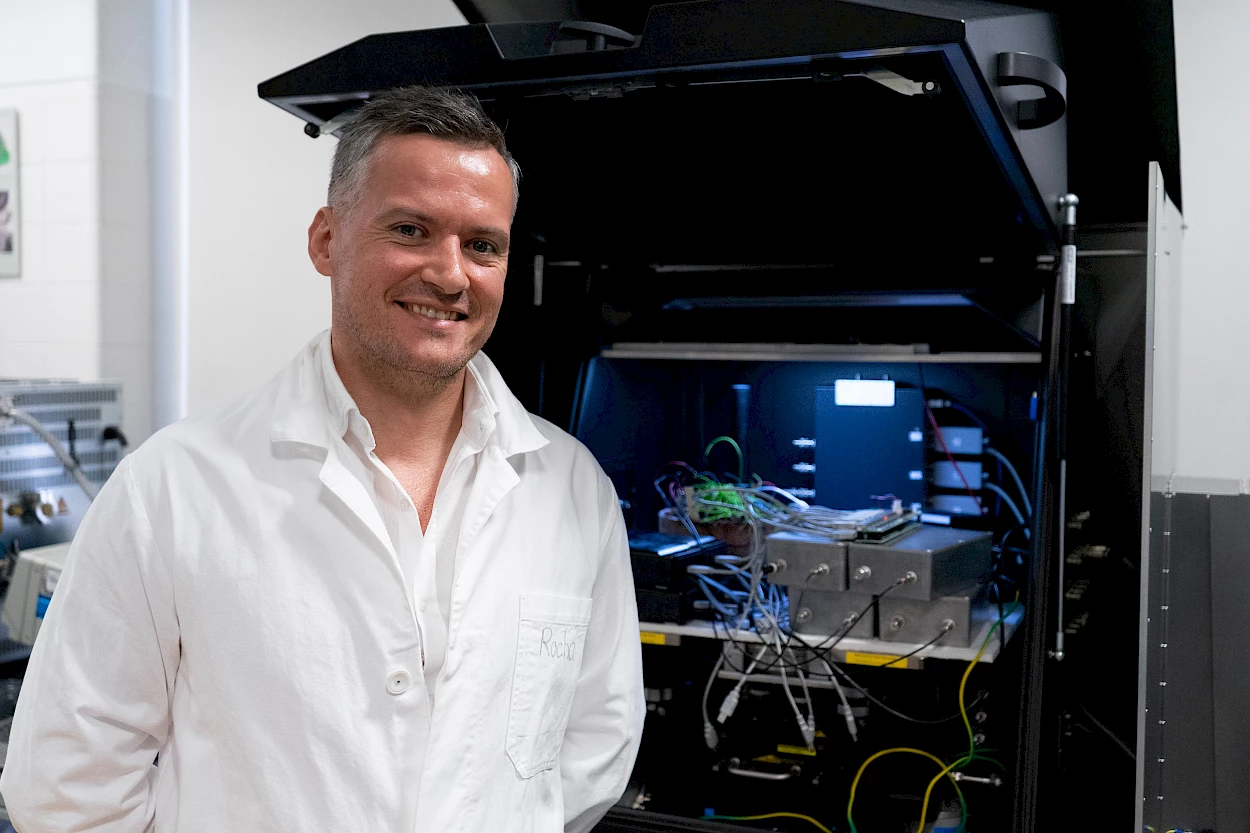GREEN: in search of a revolutionary way to produce clean energy from micro-algae.
The Generating Energy from Electroactive Algae (GREEN) research project, led by the University of Coimbra and funded by the European Research Council with more than €2.2 million, will run until the end of December 2025 and aims to develop radical new ways to generate clean energy from algae.
A few years ago, Paulo Rocha, professor at the Department of Life Sciences of the Faculty of Science and Technology of the University of Coimbra (DCV/FCTUC) and researcher at the Centre for Functional Ecology (CFE), made a groundbreaking discovery: microalgae communicate with each other, potentially leading to energy production. "We never imagined that this communication between microalgae could be used to produce something as useful as clean energy," said the scientist. This discovery inspired him to launch an ambitious research project, aimed at developing a new method of producing clean energy that does not emit greenhouse gases.
This is how the Energy Generation from Electroactive Algae project, known as GREEN, came about. It was approved on its first application for funding by the European Research Council, a highly competitive funding mechanism of the European Commission. "We are investigating the feasibility of generating energy from microorganisms such as microalgae," says the project leader. "The theory suggests it's possible, and the first practical results are promising," he reveals.
GREEN was officially launched on 1 January 2021 and has made significant progress since then, including the set-up of a new laboratory at the University of Coimbra dedicated to bioelectronics and bioenergy. Stressing that such labs are rare worldwide, the project leader wants this one to be "a world leader in these research areas".
Using the various equipment and benches available in the facility - from biological characterisation to the electrical evaluation of sensors that detect signals emitted by microorganisms - the multidisciplinary team involved in the project has thoroughly explored the potential of "creating a new type of bioenergy based primarily on communication between communities of microorganisms, especially microalgae," explains Paulo Rocha. "It is a radically different approach to energy production compared to conventional methods," he stresses.
"This project becomes even more relevant when we consider the primary source of this clean energy, which involves using what might be seen as expendable: microalgae. Some people perceive microalgae as something useless or undesirable in certain environments, such as the water industry; however, at GREEN we see these microorganisms differently, harnessing their resilience to use them as an energy source," explains the researcher.
The research has been carried out by a team of seven people, including researchers, masters and doctoral students from a range of disciplines including biology, biochemistry, ecology, electrical engineering and physics. A comprehensive understanding of these microorganisms from different disciplinary perspectives is essential in this project, and this in-depth analysis is only possible thanks to the laboratory's equipment, which, according to the scientist, includes instruments found in very few laboratories worldwide.
"The cutting-edge laboratory at the University of Coimbra is equipped with advanced technology for the biological characterisation of microalgae," explains Paulo Rocha, "because we need to understand how these microorganisms interact with our sensors in terms of biocompatibility and the growth stage of the microalgae."
"The electrical and electrochemical characterisation of the sensors developed by the team to capture these signals is also crucial. This has required significant investment in equipment; for instance, one of the main instruments purchased for this research cost more than 500,000 euros."
"We have machines that can measure very small and highly sensitive signals, including those with significant amplitude," reveals the research leader.
"Capturing and storing these signals could demonstrate the feasibility of a new form of clean energy," explains Paulo Rocha. "If we can efficiently store these bioelectric signals, we can establish a renewable energy source. That's the primary goal of the project."
With this mission, the team behind this ambitious project will continue their efforts towards a better energy future for all until December 2025.
Website of the project: https://www.greenproject.pt/
Project specification
| Title | Generating Energy from Electroactive Algae (GREEN) |
| Coordination | Centre for Functional Ecology (CFE) of the University of Coimbra |
| Duration | 5 years (1 January 2021 to 31 December 2025) |
| Total budget | €2,267,667.00 |
| Funding Agency | European Research Council | Horizon Europe Programme 2020 (European Commission) |
| Number of UC researchers involved | 7 |
| Research areas | Biology, Biochemistry, Ecology, Electrical Engineering and Physics |
Content Production and Editing: Catarina Ribeiro, DCOM; Inês Coelho, DCOM
Translation: Diana Taborda
Publication date: 25.01.2024

